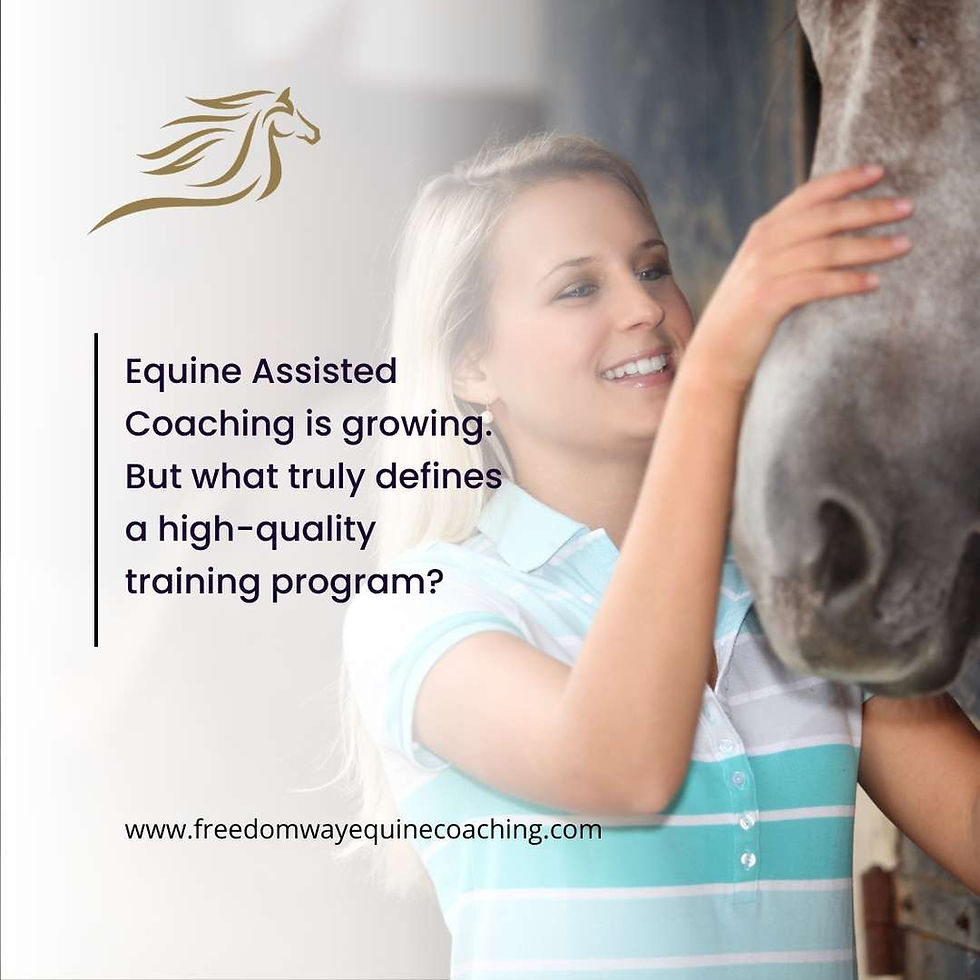Does My Horse Have What it Takes to Be an Equine Assisted Coaching Partner?
- The Freedom Way

- Jan 15, 2024
- 4 min read
Updated: Jan 28, 2025
Ever been curious about what it takes for a horse to be a part of coaching work? Let's take a peek into this fascinating world, inspired by Charlie, the latest addition to our team. A generous gift from close friends, Charlie joined the men's residential treatment center where I'm employed. This buckskin quarter horse, born on June 28, 2003, has swiftly shown a natural talent for therapy in his initial session, shedding light on the qualities essential for a therapeutic horse.

What Makes a Good Equine Assisted Coaching Horse?
Most people would tell you that the horses we partner with for coaching cannot be just any old horse. They will tell you that they must possess specific traits that make them suitable for therapeutic settings. And while this may be true to a certain extent, I believe that every horse has something to teach us, and most horses are capable of entering the world of Equine Assisted Coaching, however, some may excel in the field more than others. Here are a few of some key qualities that you might look for:
Temperament: The horse should be calm, patient, and gentle with people. They need to be comfortable with close human interaction and exhibit a soothing presence.
Training and Handling: A horse should be well-trained and easy to handle. They must respond well to commands and be adaptable to different situations and environments.
Health and Age: The horse should be in good health and of an appropriate age. Young horses may lack the necessary calmness, while older horses should be physically capable of handling the work.
Breed Considerations: While any breed can be a great coaching partner, some, like Charlie's breed, the quarter horse, are known for their steady demeanor.
Charlie’s First Day:
Reflecting on Charlie's first day at Soberman's Estate, his natural ability to connect and provide comfort was evident. This is a crucial aspect of an Equine Assisted Coaching horse - the innate ability to interact in a way that is beneficial to clients. Charlie’s previous owners had told me they believed he would a great horse for our program, and boy were they right! I could tell he would be one to excel after spending just 15 minutes with him. He was calm and quiet from the moment he was brought to the barn. (Most horses might take a day or few to settle into a new environment. Not Charlie! He walked out into the arena and was comfortable, like he had been there forever. No whinny-ing, or crying out for the old friends he left, or running his stall. He was quiet and content and walked right over to eat, easily finding and enjoying the food that was ready to welcome him.
Charlie arrived at the Estate about 12:30, and I went back out into the arena about 2:45 (15 minutes before my 3:00Pm session with 4 clients) and found him still calm and relaxed. I walked him around for about 10 min, just to make sure that he would really be ok to use on the first day. I could immediately feel how safe this horse would be, and our session was incredible. The clients all fell in love with him, and he is going to be a great addition to our stable. We are all so excited to be able to provide him with his “forever home” and his new job opportunity giving him a purpose. And yes! He is one who will definitely excel in this field.
Training Your Horse for Coaching Work:
Training a horse for coaching work usually involves more than just basic ground or riding skills. It includes exposure to a variety of scenarios and ensuring the horse is comfortable with different types of interactions, remaining safe for the clients to interact with. There are Professional training programs for Equine Assisted Coaching horses that can provide the necessary skills and assessments, but sometimes may not be necessary, as in Charlie’s case. I’ve been around horses all of my life and have trained them in many different capacities, from race horse training, cattle work, to “starting colts etc… Charlie is just a “natural” and will step into supporting clients with grace and ease, without any need for additional training.
The Role of Horses in Coaching:
Understanding the role of horses in a coaching setting is vital. They are not just pets; they play a crucial part in coaching interactions with clients. From building confidence to aiding in emotional and social development, horses like Charlie contribute significantly to the healing process.
If your horse possesses the qualities and temperament suited for coaching work, they might be a good candidate. However, it’s important to undertake the advise or assessment of someone that is familiar to this work to ensure they are safe and ready for such a responsible and impactful role.
Remember, becoming an Equine Assisted Coaching horse is a special journey, both for the horse and its owner. If you're considering this path, let stories like Charlie’s inspire you to step into this life changing field.
If you are interested in becoming an Equine Assisted Coach, we would love to have you join us! We hold two certification courses each year and our next one begins February 7, 2024. You can learn more by visiting our website at www.freedomwayequinecoaching.com




Comments